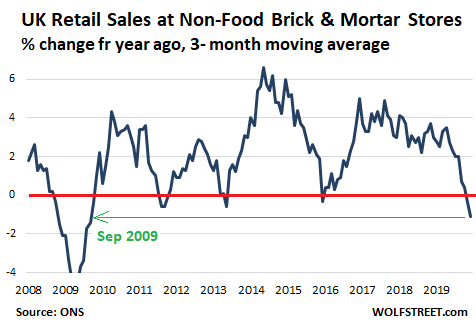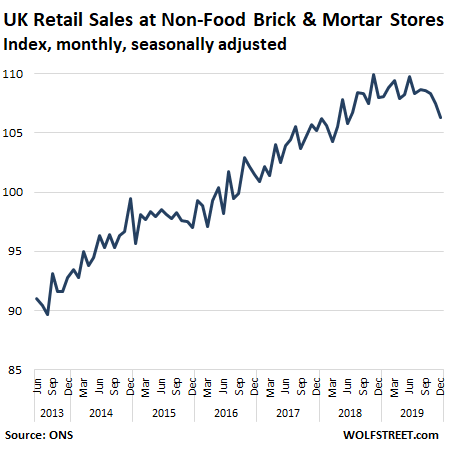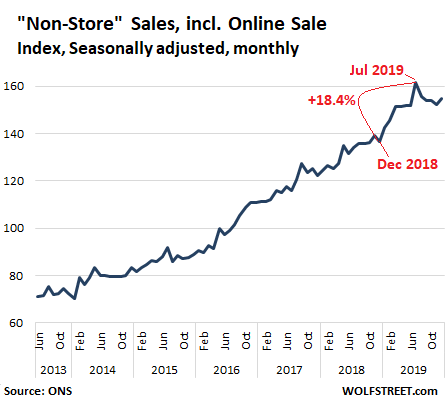By Wolf Richer and Nick Corbishley,
But even red-hot online sales cooled off late in the year as consumers turned sour.
Consumers in the UK, generally a hardy bunch when it comes to borrowing and shopping, were not in a shopping mood before the holidays. Retail sales in December at non-food brick-and-mortar stores – ranging from specialty stores to department stores – fell 1.6% compared to December last year, seasonally adjusted, according to the UK’s Office for National Statistics (ONS). The less volatile three-month moving average fell 1.1% year-over-year, the biggest decline since September 2009, when consumers were trying to clamber out of the Financial Crisis:

The decline in December caused the non-food brick-and-mortar index to drop to its lowest level since June 2018. And it’s down 3.2% since its peak in July 2019, an indication of just how fast retail sales have deteriorated in the second half of the year:

Even sales at food stores fell 1.7% year-over-year in December. But gasoline sales rose 4.7%, on higher fuel prices.
Even red-hot online sales cooled off in the second half.
Online sales – including sales by the online divisions of brick-and-mortar retailers – had skyrocketed 18.4% in the seven months from December 2018 through July 2019, to a huge all-time record, but have since fallen off, in another sign of retail weakness in the second half, reducing the 12-month growth from December 2018 through December 2019 to “just” 13.3%:

Online sales in the UK now account for 19% of total retail sales. The biggest gains were in the household goods sector whose online sales surged 23% year-over-year in December. This rapid shift to online retail poses a major threat to the viability of many brick-and-mortar stores that have failed in building a vibrant and large online business.
All combined, including online sales, fuel sales, and grocery sales, total retail sales have fallen 1.6% from the peak in July 2019 – due to the weakness in the second half – but eked out a year-over-year gain of 1.5%.
Why this sudden slow-down in retail sales in the second half?
The British Retail Consortium — which focuses on brick-and-mortar stores and doesn’t cover big online retailers, such as Amazon — hammered the uncertainty surrounding Brexit:
“2019 was the worst year on record and the first year to show an overall decline in [brick-and-mortar] retail sales. This was also reflected in the CVAs, shop closures and job losses that the industry suffered in 2019. Twice the UK faced the prospect of a no deal Brexit, as well as political instability that concluded in a December General Election – further weakening demand for the festive period.”
“We’ve had the perfect storm in recent years,” says Martin Newman, a former multichannel operator for Ted Baker, Harrods and Burberry. “The political uncertainty has fueled a fall in consumer confidence and a subsequent tightening of belts.”
And lots of bankrupt companies. The highest profile collapses in 2019 included Thomas Cook, the world’s oldest travel agent that collapsed in late September, leaving 600,000 travelers stranded abroad. It was placed into compulsory liquidation, resulting in an estimated 6,500 job losses in the UK alone.
The brick-and-mortar meltdown.
Some of the biggest retailers that collapsed include:
- Debenhams, the department store that has graced British high streets for over 200 years and which was put through a “pre-packaged” administration in April. Around 4,000 members of staff were laid off. The store continues to trade after its creditors took control of the business, but is struggling to reinvent itself and just revealed plans for 19 more store closures this month.
- Bonmarche, the woman’s fashion chain that called in administrators in October, resulting in 2,900 lost jobs. It also continues to trade in administration, but its future, like Debenhams’ (and so many other chains), remains uncertain.
- Mothercare, Clintons, Links of London, and many other retailers fell into administration in 2019.
A total of 117,000 retail jobs were lost and 14,500 stores were closed in 2019 as a result of brick-and-mortar retail companies hitting the wall or simply cutting costs in a desperate bid to stay afloat, according to a report published by the Centre for Retail Research. The report identifies four main causes of the malaise:
- The high costs of running retail outlets, including rents and high labor costs.
- Low profitability resulting from anemic sales growth, high costs, squeezed margins and ruthless price competition.
- The rapid growth of online competition, with most growth achieved at the expense of brick-and-mortar retailers.
- Lack of preparation: low investment in stores and inadequate forward planning to anticipate the challenges of the future.
British consumers and their cherished credit cards.
Credit card balances have multiplied by a factor of four in seven years, from the post-Financial Crisis low of £55 billion in 2012 to £225 billion in November 2019. UK households, among the most solvent a generation ago, are now among the most indebted. Retailers and economists cherish that.
But the appetite for fresh debt appears to be fading, partly due to weaker confidence and the weakening retail environment late last year, but also because many consumers have already reached the outer limits of their borrowing capacity. In November, credit card balances fell on a monthly basis for the first time since July 2013, according to the Bank of England. But due to the online spending-and-borrowing spree in early 2019, credit card balances in November were still up 5.6% year-over-year.
Not even the “bankruptcy” word hanging over super-troubled Italian infrastructure giants Atlantia and Autostrade, whose bridge collapsed last year, can get their bonds to reflect any kind of serious risk. Read… Nutty Bond Wonderland in Europe Just Reached New Heights of Madness.
Source: WOLF STREET.
Disclaimer: We at Prepare for Change (PFC) bring you information that is not offered by the mainstream news, and therefore may seem controversial. The opinions, views, statements, and/or information we present are not necessarily promoted, endorsed, espoused, or agreed to by Prepare for Change, its leadership Council, members, those who work with PFC, or those who read its content. However, they are hopefully provocative. Please use discernment! Use logical thinking, your own intuition and your own connection with Source, Spirit and Natural Laws to help you determine what is true and what is not. By sharing information and seeding dialogue, it is our goal to raise consciousness and awareness of higher truths to free us from enslavement of the matrix in this material realm.
 EN
EN FR
FR


























Plaine and simple peole have run out of money they can’t borrow any more and the main thing thats killing it is the over priced rent on property the goverment wont kerb the cost of rent and do you know why its because they get to take a big slice of the rent in taxes from the land lord And when you have to pay out
Rent, Rates, Gas, Electric, Water, Insurance, Tax, Food, Petrol, this will take 75% of the normal working couple leaving only 25% if that to live this is with out any debt
Thats why i wont play that silly game any more I am now living in a caravan which i am buying which means no Rent Rates Gas Electric saving me a bundle and my advice to any one would be if you are in debt up to your neck in debt and paying rent go bankrupt and move into a caravan and sleep were ever you want to and you get to keep all your money and wont have to borrow any money and you wont be spending money on uless household goods because there is no room for it in a caravan